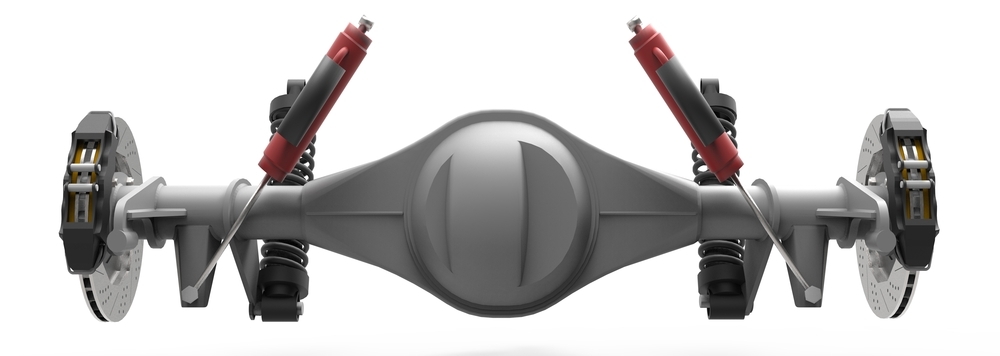
23 Jun Car Axles in Suspension Systems: So How Do They Work?
 Transportation has come a long way since the horse-and-buggy days of yesteryear. And not only in terms of speed and convenience. Rider comfort in today’s vehicles is vastly superior, too. You can thank the inventors of the modern automotive suspension system, including car axles in both front-wheel drive and rear-wheel drive vehicles. Let’s explore the details of car axles and how they improve your life every time you drive your vehicle.
Transportation has come a long way since the horse-and-buggy days of yesteryear. And not only in terms of speed and convenience. Rider comfort in today’s vehicles is vastly superior, too. You can thank the inventors of the modern automotive suspension system, including car axles in both front-wheel drive and rear-wheel drive vehicles. Let’s explore the details of car axles and how they improve your life every time you drive your vehicle.
What Are Car Axles?
A car axle serves two main functions. It supports the vehicle’s weight and helps maintain the position of the wheels relative to each other and the chassis. Car axles are a central shaft or rod that connects and supports a vehicle’s wheels. They transfer power from the engine to the wheels, allowing a car to move forward and backward. Car axles are vital for your vehicle’s stability, balance, and overall performance.
Suspension System Axle Types
There are several types of car axles. Their design varies depending on the vehicle’s make and model. Two common types of car axles are:
Live Axles (aka Solid or Rigid Axles)
Live axles, also known as solid axles or rigid axles, connect both wheels on an axle. Rear-wheel drive (RWD) and some four-wheel drive (4WD) vehicles used live axles. Solid axle suspension systems are inexpensive to manufacture, offer lots of wheel travel (which benefits off-road travel), and can carry large, heavy loads, making them popular for use in trucks. In a live axle setup, the vehicle’s wheels connect to the axle and rotate together as a single unit. Rigid axles are simple, robust, and cost-effective. However, they often result in a rougher ride and reduced traction, especially on uneven terrain.
Independent Axles
Most modern vehicles, including sedans, SUVs, and some sports cars, utilize an independent axle setup. Independent axle suspension systems are more complex but offer improved traction, stability, and more ride comfort compared to live axles, particularly on rough or uneven roads. Each wheel connects to its own axle, allowing each one to move independently of each other. Independent axles are often installed in front-wheel drive (FWD) and all-wheel drive (AWD) vehicles. The drawbacks include increased manufacturing cost, reduced wheel travel, and lower load capacity.
How Do Car Axles Work?
Car axles are a vital component of a vehicle’s suspension system. They support the weight of both the car and its passengers while transmitting driving force from the engine to the wheels. Car axles also ensure that the wheels rotate correctly and provide vehicle stability. Most passenger cars have two axles: a front and a rear. Some larger or heavy-duty vehicles have additional axles.
Front-Wheel Drive
In general, front-wheel drive vehicles are lighter than those with rear-wheel and all-wheel drive, as they do not require the same driveshaft and differential components. The front axle supports the front wheels and distributes the vehicle’s engine weight for proper balance.
Rear-Wheel Drive
In vehicles with rear-wheel drive, the rear axle transmits power from the engine to the transmission, which sends it to the rear differential. The rear differential fastens to the axle shafts and splits the power between the two rear wheels. As the engine generates power, the axle shafts rotate, causing the rear wheels to spin.
Signs Of Damaged or Worn Car Axles
If you notice any of these warning signs, schedule a diagnostic service to address the issue. Trained technicians can often repair minor problems, such as damaged seals or bearings; however, severe damage to the axle shaft itself may require replacement.
- Clicking or clunking noises
- Difficulty steering
- Loss of power to the wheels
- Uneven tire tread wear
- Vibration
Car Axles Maintenance
Routine maintenance can prolong the life of your car’s axles. Avoid actions that put extra stress on the suspension system. Overloading your vehicle, driving over rough terrain, and hitting potholes can cause damage to your car’s axles.
Suspension System Service in Plymouth Meeting, PA
Plymouth Auto & Tire Center accepts all makes and models but is recognized for providing superior service on light-duty Honda, Toyota, and Ford trucks by NAPA, AAA, and the local Better Business Bureau. Trust our 50+ years of combined experience from our ASE-certified technicians. We offer competitive pricing on front-wheel drive and rear-wheel drive suspension system parts and labor, as well as monthly service specials.
Make An Appointment
For quality car axles inspection, maintenance, and repair in Plymouth Meeting, PA, call us at (610) 825-6558 or visit our website to make your next appointment.

